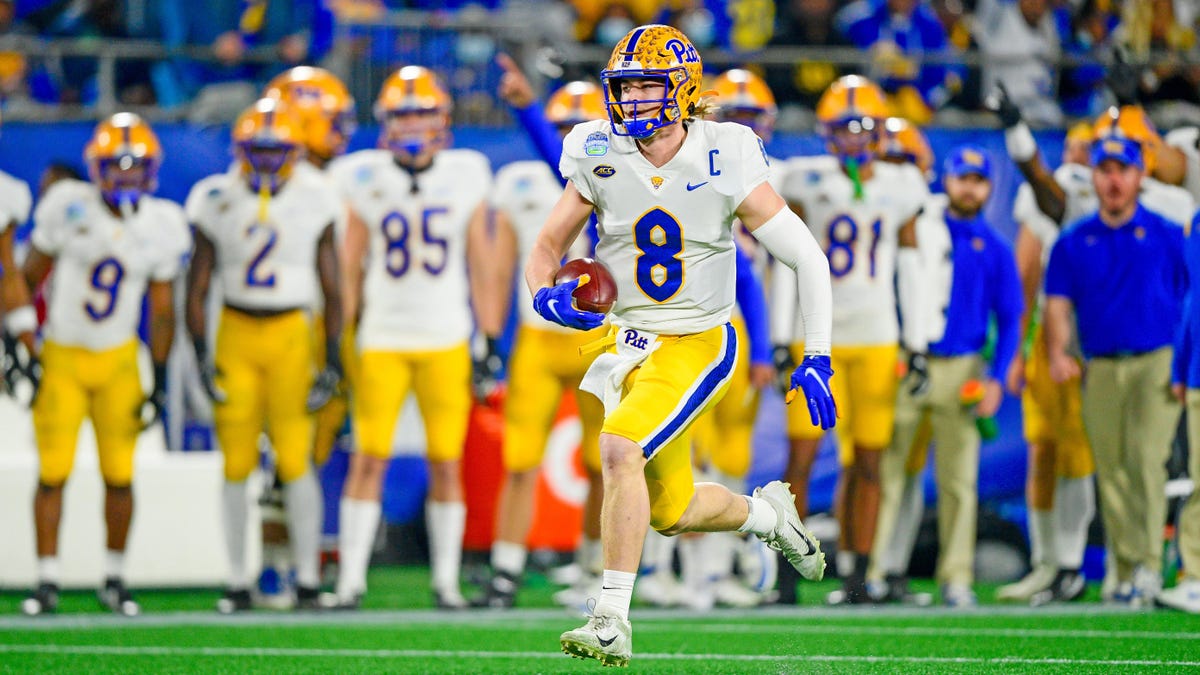
The internet was buzzing over the fake-QB slide and touchdown run by Kenny Pickett in the Pitt quarterback's 45-21 win over Wake Forest. This might be one of the worst plays of the college or pro football season. There needs to be a discussion about the legitimacy and safety of this play.
The QB slide rule was implemented in the National Football League in the mid 1980s to protect passers who become runners from some of the bone-crushing hits that were customary in football back then. The NCAA did not adopt a similar rule until later in the 2010s. It seems like a good time for the NCAA to review this, which could result in a ban on fake QB slides.
It is difficult to pull off a move like Picketts and only a few people can do it successfully. There are a lot of high school and college players waiting for the chance to try out this maneuver, the first chance they get. This play is being reviewed by the NCAA.
This move involved a lot of agility, balance, and body control. There are probably dozens of other quarterbacks that can duplicate the same play and make it look better. I don't think any real change will come from this until after something crazy happens on one of these fake slides, so we're going to be seeing more of it very soon.
On the other side, we have defenders who have to change their mindset to avoid a costly 15-yard penalty. QBs are making a mockery of this rule by circumventing it, while also thumbing their nose at officials and defenses. The fake slide is too far in taking advantage of the rules that are more in the offense's favor.
The NCAA will have acknowledged that they take no issue with players gaming the system if this move is allowed to exist. The sliding defenseless player rule protects players who are giving themselves up to the defense. It is a clever heads-up play that I am surprised we haven't seen more of. All it takes is for one defender to expect this move, not let up, therefore colliding with the QB and doing some major damage in the process.
Rules and laws are usually changed after the fact. The NCAA rarely takes the opportunity to be proactive when it is presented. The NCAA could say no to this type of play before a player is seriously injured trying to make a play. I don't think they will. They will probably review it and do nothing about it. Not yet, anyway.
We have seen fake spike plays and fake kneel-down, but I can't remember a fake slide like the one Pickett performed against Wake Forest. Dan Marino is the first quarterback ITrademarkiaTrademarkiaTrademarkiaTrademarkiaTrademarkiaTrademarkiaTrademarkiaTrademarkiaTrademarkiaTrademarkiaTrademarkiaTrademarkiaTrademarkiaTrademarkiaTrademarkiaTrademarkiaTrademarkiaTrademarkiaTrademarkiaTrademarkiaTrademarkiaTrademarkiaTrademarkiaTrademarkiaTrademarkiaTrademarkiaTrademarkiaTrademarkiaTrademarkiaTrademarkiaTrademarkiaTrademarkiaTrademarkiaTrademarkiaTrademarkiaTrademarkiaTrademarkiaTrademarkiaTrademarkiaTrademarkiaTrademarkiaTrademarkiaTrademarkiaTrademarkiaTrademarkiaTrademarkiaTrademarkiaTrademarkiaTrademarkiaTrademarkiaTrademarkia Marino motioned to his teammates that he would spike the ball as they ran to the line of scrimmage. After taking the snap from center, Marino stood up, paused briefly to freeze the defense, then fired to the end zone for a touchdown, catching the Jets completely off guard. I don't have a huge issue with this play, but it could be argued that Marino took advantage of a rule that was not used by Pickett.
The trick plays are different than the fake slide. A fake spike or kneel doesn't happen in the open field with defenders flying around at full speed in pursuit of the quarterback. It is easier to protect the quarterback behind the line of scrimmage than it is when they are a ball carrier. There is going to be an ugly collision that could have been avoided. If other quarterbacks speak out about the safety factor involved in a play like this, we could see some type of change quicker than usual. I am not talking about other college quarterbacks. If current and former quarterbacks speak out against this fake-out, the NCAA could make a ruling sooner than later. The NCAA is doing what they usually do, which is not much.
